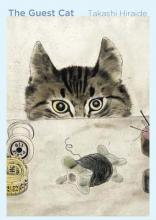inspiration + perspiration = invention :: T. Edison ::

Reading prose written by a poet is itself a work of translation. Adding an actual language translation on top of that shift in writing can make for a challenging read. The Guest Cat by Japanese poet Takashi Hiraide (as translated by Eric Selland) is certainly easy to consume but difficult to digest, a deceptively short novel that scratches at various themes in colorful vignettes that never quite feed into a specific narrative.
The author and his wife live in a rented cottage in a tiny alleyway. Their immediate neighbors, fellow tenants, take in a cat who, while belonging very much to the house next door, makes it his business to adopt the narrator's family as well. Day by day, in quiet moments, Chibi the cat grows ever more entwined in their lives, even as outside events conspire to force change on this idyll. Tragic circumstances will force this little family to accept many transitions.
If this novel accomplished nothing else it gave me a thirst for Hiraide's poetry. He writes with simple, clear beauty. Little moments of the cat and the garden are captured in language that is at once intimate and expansive. As a cat person myself I appreciated the description of Chibi's frolicking, contrary nature. The endearment the narrator and his wife felt for this animal, and the affection Chibi displayed for them, is ever present throughout each interaction without dipping into melodrama or sentimentality. Had the novel only been comprised of these tender memories I might have rated it a far better read.
There's a sense that the author felt he needed more to sustain the work, though, and there the story feels flimsy. It may be that I simply do not have an appreciation for this style of Japanese storytelling. The narrator introduces many larger ideas over the course of the book: concerns about careers, family, aging, mortality. But these thoughts are ephemeral, like the skimmer insects the narrator and cat play with in the garden, introduced one day and gone the next.
The one subplot that had real staying power, that of their landlady's descent from vital independence into elderly dependence, never resolved in any way, merely fading into the background of the narrator's changing life circumstances. Perhaps it was intentional to do so, considering the nature of her story, but it left the book feeling unfinished, like a painting only partially filled in.
Despite these minor complaints, I found the book a restful means of topping off a stressful day. The writing's beauty soothed my mind for sleep with just enough plot to keep me engaged but not wide awake. Like a lullaby, its very simplicity lulled me to a restful place. If you're able to appreciate such an unassuming, playful spirit, frailty and all, I recommend you invite The Guest Cat in.
This review is also posted at Goodreads and Amazon. I did not receive anything from the publisher or author for this review. The cover was designed by Erik Rieselbach with artwork by Leonard Tsuguharu Foujita. The book is currently available from New Directions via Amazon as a Paperback ($11.79) and eBook ($9.99).





